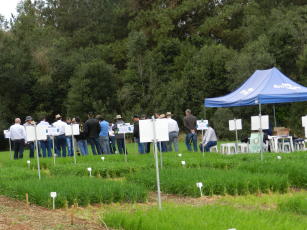Capacity-building in vegetable production free from biological and chemical contamination in the Brazilian North, Northeast, Midwest and Southeast
Capacity-building in vegetable production free from biological and chemical contamination in the Brazilian North, Northeast, Midwest and Southeast

Photo: ANTUNES, Joseani Mesquita
According to a mapping made by the Brazilian Family Budget Survey, which investigates individual food consumption in a total sample of homes, there is a scenario that favors an epidemic of obesity and other non-communicable chronic conditions related to excessive and/or unbalanced food consumption. Thus encouraging the consumption of vegetables helps healthy diets, since they are served on the side of a protein and a carbohydrate. Vegetables are low in calories and rich in water, fiber, vitamins, minerals, and phytochemicals. A production based on good agricultural practices, combined with cultivation techniques that provide the harvest of safe food, entails the proposal of training for multipliers, i.e. extension workers and family farmers who work as information multipliers. Promoting training courses aims at an effective understanding of the basic production system in a healthy and educational way.
Ecosystem: Amazonic, Mid-North, Caatinga Region and Mixed forests, Cerrados Region
Status: Completed Start date: Sat Apr 01 00:00:00 GMT-03:00 2017 Conclusion date: Tue Mar 31 00:00:00 GMT-03:00 2020
Head Unit: Embrapa Vegetables
Project leader: Flavia Maria Vieira Teixeira
Contact: flavia.vieira@embrapa.br
Keywords: Olericultura, Sustentabilidade, Alimentação saudável
